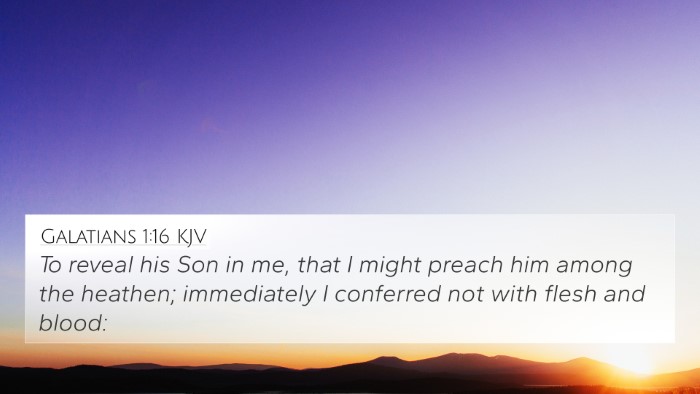Understanding Acts 26:19
Acts 26:19 reads: "Whereupon, O king Agrippa, I was not disobedient unto the heavenly vision." This verse highlights the Apostle Paul's commitment to his divine calling following an encounter with the risen Christ. Below we explore the insights drawn from various public domain commentaries, including those by Matthew Henry, Albert Barnes, and Adam Clarke.
Meaning of Acts 26:19
In this proclamation before King Agrippa, Paul emphasizes the necessity of obedience to the vision he received from God. His response encapsulates a pivotal moment in his transformation from persecutor to proclaimer of the Gospel.
-
Matthew Henry's Commentary: Henry asserts that Paul's declaration signifies his unwavering dedication to fulfilling God's command. Paul acknowledges the importance of heeding divine revelations and demonstrates his transformation by actively preaching the Gospel to both Jews and Gentiles.
-
Albert Barnes's Notes: Barnes elaborates on the concept of a "heavenly vision," stating that it signifies divine guidance in Paul’s mission. He emphasizes that Paul’s obedience was not mere acceptance; it involved vigorous action in spreading the faith that had transformed him.
-
Adam Clarke's Commentary: Clarke focuses on the accountability that comes with a divine encounter. He notes that the phrase "not disobedient" signifies Paul's resolve to follow God's will despite the challenges he faced. This dedication highlights a theme of faithfulness in responding to divine instruction.
Bible Verse Cross-References
Acts 26:19 resonates with various other scriptures, showcasing its thematic connections. Below are 11 Bible cross-references that relate to this verse:
- Acts 9:15-16: The commissioning of Paul to preach to the Gentiles, indicating the divine purpose behind his conversion.
- Romans 1:16: Paul expresses the importance of the Gospel. His willingness to share it is a direct outcome of his heavenly vision.
- 2 Corinthians 5:14-15: This passage demonstrates Paul's motivation driven by love for Christ, reflecting his obedience to the calling he received.
- Galatians 1:15-16: Paul discusses being called by God from his mother's womb, highlighting the sovereign choice of God in his mission.
- Philippians 3:14: Paul speaks of pressing toward the goal for the prize of the high calling, indicative of his commitment to follow the vision.
- 1 Timothy 1:12-13: Paul recounts his former life before his encounter, underscoring the significance of responding to God’s call.
- 1 Peter 2:9: A reminder that believers are called to proclaim His praises, similar to Paul's mission initiated by his divine vision.
- Matthew 28:19-20: The Great Commission, encouraging all believers to spread the Gospel, much like Paul’s obedience to his vision.
- Acts 20:24: Paul discusses the ministry he has received, emphasizing the importance of fulfilling his calling regardless of adversity.
- John 12:26: Jesus speaks of serving Him, which resonates with Paul's obedience to follow Christ's command.
- Revelation 22:12: Affirming the importance of one's deeds in relation to their obedience to God, consistent with Paul's stance in Acts 26:19.
Thematic Connections in Scripture
The themes of obedience, divine calling, and transformation are prevalent in the Bible and tie numerous verses together illustrating the continuity of God's purpose from the Old Testament through the New Testament. For anyone studying scripture, understanding these connections can enhance their knowledge of how God actively engages and guides His followers throughout both the Hebrew and Christian scriptures.
Conclusion
Acts 26:19 serves as a vital reminder of the importance of obeying God's calling. Paul's example encourages believers to respond to divine visions with faithfulness, as chronicled through the lens of biblical narratives and inter-Biblical dialogue. Whether one seeks understanding, connections between Bible verses, or thematic explorations, the scripture presents an inviting landscape for deeper study and reflection.











